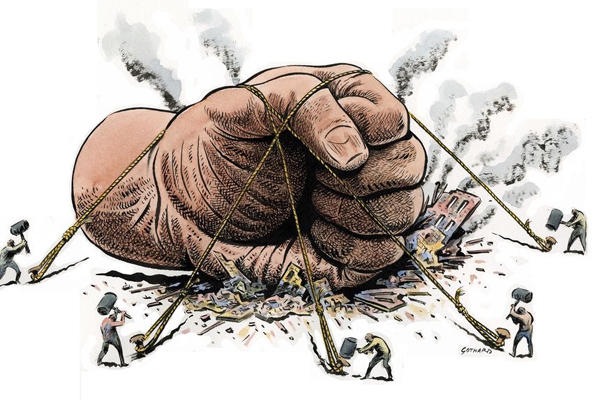A chance to rediscover the principles of freedom and democracy, eroded by illiberal intellectual fads.

By Aaron Rhodes
Russia’s war against Ukraine could restore Western societies’ appreciation for freedom and democracy. These principles have been eroded for decades by leftist ideologies and illiberal philosophical fads.
Vladimir Putin’s invasion has exposed the reality of power politics, in which competing blocs of free and despotic states are again driving history. Multilateral groups like the United Nations Human Rights Council have been co-opted by malign actors. Such organizations had little influence on Mr. Putin’s decision to proceed.
The war in Ukraine also has begun to unite the West. Fence-sitters, in particular Germany, have abandoned passive policies of moral equivalence and joined the American- and British-led effort to help Ukraine defend itself. The anti-American left’s reflexive habit of blaming the North Atlantic Treaty Organization for Russian paranoia and aggression isn’t working this time. NATO, which offers members collective defense and guarantees citizens of member states that their militaries will remain under civilian control, has new love around the world. Divisions between Western and Eastern Europe are yielding to a more unified identity that has long eluded the Continent.
Western Christian conservatives once looked to Mr. Putin as a savior of Christendom, but that romance has soured. In her biography, “The Man Without a Face,” journalist Masha Gessen revealed Mr. Putin as a merciless leader whose brutal policies in Chechnya and elsewhere are at odds with Christian faith
The Cold War offered vivid examples of the differences between liberal democracies and totalitarian regimes. Human rights meant the right to individual freedom, what Immanuel Kant called the only truly inherent right. Western leaders defended freedom and demanded it for those behind the Iron Curtain. Even during the social unrest of the 1960s, the consensus in Western societies held that political freedom was more legitimate than communist coercion.
After the Soviet Union collapsed, its collectivist illusions seeped into mainstream Western thought. Collectivism found new life and morphed into a form of progressive authoritarianism that promotes global institutional control over national democracies. In recent decades, the commitment to defending fundamental freedoms has dwindled in Western societies, to the point that many young people, with no memory of the challenge of Soviet communism, not to mention the Third Reich, are cynically indifferent to liberty. Under the influence of intellectual trends like postmodernism, the appreciation for inherent rights and freedoms has waned in the West.
Other wars since 1989 increased Western ambivalence about the value of political rights and freedoms. The Balkan wars of the 1990s claimed as many as 140,000 lives and included the genocidal massacre of civilians. The continuing war in Syria, where Mr. Putin tested new missiles and trained military personnel, has killed about half a million people. The U.S. wars in Iraq and Afghanistan, and the broader war on terror, all ended up dividing Western nations because they were associated with party politics or were too remote to penetrate Western minds.
This war is different. It is driven by a dictator seeking to stir up ethnic divisions and the specter of Nazism where they hardly existed. It is a war of conquest by a statist regime against a society seeking democracy and peace. Mr. Putin’s attack on Ukraine is emblematic of a world-wide conflict between democratic and hegemonic powers. It thus offers an opportunity for moral clarity, which will be crucial in the years and decades ahead.
__________________________________________________
Mr. Rhodes is senior fellow in the Common Sense Society, and president of the Forum for Religious Freedom-Europe. He was executive director of the International Helsinki Federation for Human Rights 1993-2007. Energiesnet.com does not necessarily share these views.
Editor’s Note: This article was originally published by The Wall Street Journal-WSJ, on March 03, 2022. All comments posted and published on EnergiesNet.com, do not reflect either for or against the opinion expressed in the comment as an endorsement of EnergiesNet.com or Petroleumworld.
Use Notice: This site contains copyrighted material the use of which has not always been specifically authorized by the copyright owner. We are making such material available in our efforts to advance understanding of issues of environmental and humanitarian significance. We believe this constitutes a ‘fair use’ of any such copyrighted material as provided for in section 107 of the US Copyright Law. In accordance with Title 17 U.S.C. Section 107. For more information go to: http://www.law.cornell.edu/uscode/17/107.shtml.
EnergiesNet.com 03 04 2022







